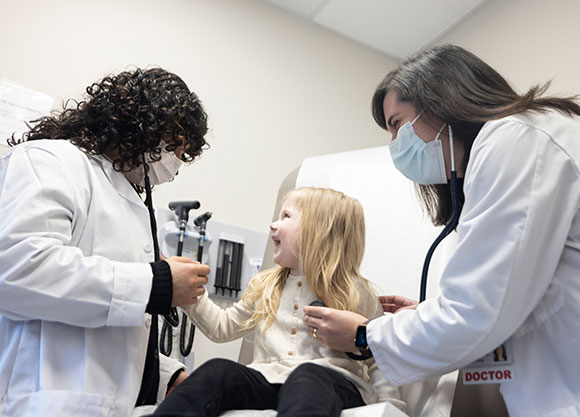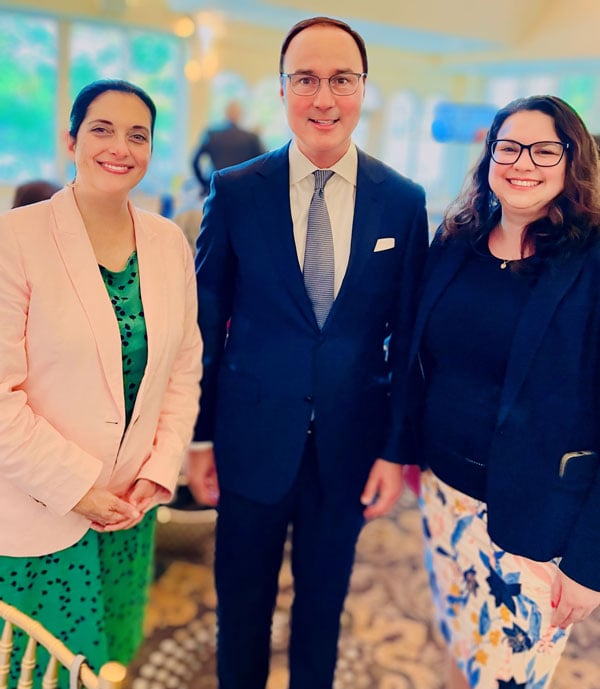
School of Medicine ranked No. 7 nationally for most graduates practicing in rural areas
Netter lauded for rural family medicine residency and rural psychiatry residency programs
September 17, 2024

September 17, 2024

The scent of homemade stock, hand-carved chicken and homegrown vegetables wrapped its arms around anyone who was lucky enough to be in the kitchen. The stew was always made from scratch with the freshest ingredients and the deepest gratitude.
It was for Dr. Albert, after all.
“Anything more than major medical, my parents would sometimes barter. I can still see my mom when it was time for our shots as kids,” Marquis-Eydman said. “If there wasn’t a townwide, line up the kids and give them their shots kind of thing, we would go see Dr. Albert.
“My mom would bring him a giant pot of chicken stew, and Dr. Albert would take that chicken stew and say thank you. He’d give us our shots, check our ears and send us on our way.”

From left: Dr. Traci Marquis-Eydman, Dr. Phil M Boiselle and Dr. Remy A. Sirken
For the girl who saw herself in a family medicine white coat someday, the future was clear. Dr. Rodrigue Albert sent her on a path of purpose as a physician, professor and scholar at the Frank H. Netter MD School of Medicine at Quinnipiac University.
Marquis-Eydman, associate professor of family medicine and program director of the school’s rural family medicine residency program, always envisioned Netter achieving its recent No. 7 national ranking by U.S. News & World Report for most graduates practicing in rural areas.
Now, it’s a reality — for both Marquis-Eydman and Dr. Remy A. Sirken, assistant professor of psychiatry and program director of the rural psychiatry residency program.
Netter earned the distinction after 18.5% of its graduates from 2014-17 entered practice in some of the country’s most rural and underserved areas. Notably, Netter is the only medical school in Connecticut within the top 30 nationally for this category.
“Dean (Phillip) Boiselle and the university value serving the underserved,” Marquis-Eydman said. “ It's that commitment to expanding access and equity that has really been at the core of everything we do. We need so many more rural family physicians to provide comprehensive primary care, and we also need rural psychiatry, rural surgery, rural emergency medicine, and rural (obstetrics) desperately. We need all of it.”
For five years, Marquis-Eydman and her colleagues worked on building a family medicine residency program to meet the needs of underserved patients. Every detail had to align on a runway to excellence — resources had to be secured, accreditation requirements had to be met and partnerships had to be fostered.
Together, these residents in white coats will form a special bond with residents of their new communities, just like Dr. Albert did in Fort Kent, Maine.
Since its founding in 2019, Netter’s rural family medicine residency has blended a rural track with an urban foundation, Marquis-Eydman explained.
Residents spend their first year at St. Vincent’s Medical Center, a 473-bed community hospital in Bridgeport, Connecticut, and at the primary care clinic in Bridgeport. The next two years are spent treating patients in northwestern Connecticut at Charlotte Hungerford Hospital in Torrington, a 109-bed community hospital, with their continuity clinic in nearby Winsted.
Both hospitals are affiliated with Quinnipiac partner Hartford HealthCare, which has provided even more opportunities for learning and collaboration.
“There are a lot of inpatient rotations in year one with this residency,” Marquis-Eydman said. “The beauty of training in Bridgeport and at St. Vincent’s is the richness in diversity and the richness in volume.”
“When residents get to the rural part of the program, they have an incredible foundation of knowledge and experience. There’s really nothing they haven’t seen,” she said. “Torrington also has a surprising amount of diversity, including socioeconomic diversity. Charlotte Hungerford offers a wide breadth of services. It’s this amazing community hospital tucked in the corner of Connecticut.”
Along with the rural family medicine residents, Charlotte Hungerford has started working with Netter’s third-year and fourth-year medical students in clerkship programs. “The third- and fourth-year rotations at Charlotte Hungerford have really become quite competitive,” Marquis-Eydman said.
The rural psychiatry residency is also grounded in diverse experiences. This four-year program begins with two years of training at St. Vincent’s Medical Center and St. Vincent’s Behavioral Health Services a few miles away in Westport, Connecticut. The last two years of the residency are spent treating patients at Charlotte Hungerford Hospital.
For Sirken, it might as well be in her backyard.
Growing up a Metro-North train ride from New York, the path to becoming director of the rural psychiatry residency program was never far away for Sirken. She was comfortable in the suburbs or the city. People were people, after all.
After an adult psychiatry residency at the Institute for Living in Hartford, Sirken completed her forensic psychiatry fellowship at Yale in New Haven. It wasn’t long before she was serving in leadership positions — first as medical director for inpatient psychiatry at Danbury Hospital, and later, as chief of psychiatry and regional vice chair for the department of psychiatry at Waterbury Hospital.
Now, as founding director of the rural psychiatry residency program at Netter, Sirken shares her commitment to underserved patients with her residents — and still has plenty left to go around. It’s a prescription for kindness and healing as much as teaching.
“It really aligns with a mission to provide an innovative and inclusive environment where we can train the next generation of psychiatrists for excellence in clinical practice, leadership, education, scholarship and connection to the community,” she said.
This combination of rural and urban populations offers psychiatry residents the opportunity to learn from their patients, their mentors and each other.
“The goal of these residency programs is for them to exist in perpetuity, right? We need them to have a long-term impact on physician shortages and expose our learners to different kinds of environments,” Sirken said. “The goal here is for everyone to become exceptional innovators, educators and clinicians. It’s a real privilege for me to train the next generation of psychiatrists.”
While Netter students and residents continue to learn and thrive, the need for rural physicians and rural hospital stability grows more urgent every day, according to July 2024 data from the Centers for Medicare and Medicaid Services (CMS), a federal agency.
With 703 rural hospitals currently at risk of closing — more than 30% of the rural hospitals in America — access to healthcare is more precarious than ever for underserved communities.
Even more alarming, 360 of these rural hospitals are at immediate risk to close within the next two to three years, according to an analysis of the CMS data by the Center for Healthcare Quality and Payment Reform.
“It’s a total crisis,” Marquis-Eydman said frankly.
Almost every state in America is impacted, including Connecticut and Maine. In Connecticut, two hospitals are at risk of closing, while another is at immediate risk of closing. In Maine, 10 hospitals are at risk of closing, with six more at immediate risk of closing.
In Aroostook County, better known as “The County” in northern Maine, the need for quality, sustainable healthcare is particularly acute. It’s a huge area covering more than 6,600 square miles — bigger than Connecticut.
But with only 67,000 people living in Aroostook County, its population density is a fraction of Connecticut’s 3.6 million people, according to the U.S. Census Bureau.
“A big part of the problem is that you don’t have the same longevity anymore (with physicians). They may come to help pay off debt and provide excellent care, but then many leave, so you end up with a lot of turnover, and it’s very difficult to recruit to a rural area,” Marquis-Eydman said.
“Think about it for a second. If trainees don’t have any experience in a rural area, if they didn’t grow up in a rural area, if they didn’t go to a medical school or train in a rural area, they don’t know what they don’t know,” she said flatly. “There are a lot of misconceptions out there about what living and practicing in a rural community is actually like.”
And yet, the impact of these circumstances is real.
“It's wild how far people need to go for care. Northern Maine Medical Center recently made the difficult decision to close their (obstetrics) service line, so now pregnant women need to drive a minimum of an hour to deliver a baby,” Marquis-Eydman said.
“It's a real challenge. The maternity deserts are only going to get worse,” she said. “You're going to see more and more blank spaces where women need to drive very, very far to deliver babies.”
Marquis-Eydman figures her family has lived in northern Maine and the Fort Kent area for at least seven generations. They’re not just part of the fabric. They built the loom.
It was the same thing with Dr. Albert, the son of a physician. He opened his first office in Fort Kent in 1962 and enjoyed privileges at Northern Maine Medical Center for 35 years. His 2001 obituary reads, in part, “He was a loyal physician, healing and touching the lives of many all over Northern Maine and Western New Brunswick.”
Marquis-Eydman worked for Dr. Albert growing up as a secretary during the summer, trying to get some experience before applying to medical school at Dartmouth. These days, Dr. Albert’s son, Charles, is a physician assistant in Fort Kent and a third-generation clinician.
He also happens to treat Marquis-Eydman’s father, Jim.
Jim Marquis is a retired biology teacher and principal. In January, he was named the Fort Kent Citizen of the Year, a fitting tribute for a man who drove an ambulance for $1 per shift for 17 years after he retired.
Her mother, Linda Marquis, volunteers at Northern Maine Medical Center, just like always. “I definitely credit my parents for my commitment to service,” Marquis-Eydman said.
As noble and generous as that may be, it doesn’t change the reality of rural family medicine in Fort Kent. A dermatology trip to Bangor is three hours away. A surgery consultation in Portland is seven hours by car.
“If we don't recruit local talent who have a connection to their communities, we are missing the boat. We've got to expose more medical students to these opportunities because the need, and the rewards, are so great,” Marquis-Eydman said. “But it’s not easy.”
“In primary care, you may need to see 20 patients a day. You have this mountain of paperwork, and all the messages and phone calls in between. It's not for the faint of heart, but I can't imagine not knowing my patients like I know my patients. I wouldn’t trade it for anything.”
Suddenly, Marquis-Eydman sounds an awful lot like Dr. Albert. Somewhere, there’s a giant pot of chicken stew waiting on the stove.
Quinnipiac Today is your source for what's happening throughout #BobcatNation. Sign up for our weekly email newsletter to be among the first to know about news, events and members of our Bobcat family who are making a positive difference in our world.
Sign Up Now